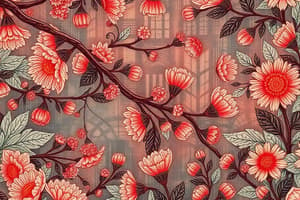Podcast
Questions and Answers
What type of mediators are complement proteins considered to be?
What type of mediators are complement proteins considered to be?
- Neurotransmitter mediators
- Plasma-derived mediators (correct)
- Cell-derived mediators
- Hormonal mediators
Which cell type is primarily responsible for synthesizing mediators like major basic protein?
Which cell type is primarily responsible for synthesizing mediators like major basic protein?
- B cells
- Neutrophils
- Mast cells (correct)
- Eosinophils
Which response is associated with an increase in white blood cell count during inflammation?
Which response is associated with an increase in white blood cell count during inflammation?
- Fibrinolysis
- Leukocytosis (correct)
- Mitosis
- Aging
What is the primary function of anti-inflammatory agents in the inflammatory process?
What is the primary function of anti-inflammatory agents in the inflammatory process?
What outcome is associated with M2 T cell-derived signals during inflammation?
What outcome is associated with M2 T cell-derived signals during inflammation?
Flashcards
Plasma-derived mediators
Plasma-derived mediators
Molecules in the blood that trigger inflammation.
Cell-derived mediators
Cell-derived mediators
Inflammation triggers from cells.
Mast cells
Mast cells
Cells that release inflammatory signals.
Complement proteins
Complement proteins
Signup and view all the flashcards
Acute-phase response
Acute-phase response
Signup and view all the flashcards
Study Notes
Mediators of Inflammation
- Mediators of inflammation are chemical substances that regulate inflammation.
- Two types exist: plasma-derived and cell-derived mediators.
- Plasma-derived mediators are proteins circulating in the blood, becoming active in response to inflammatory triggers. They are mainly produced in the liver.
- Cell-derived mediators are produced locally by cells.
- Most mediators are short-lived, breaking down quickly or being inactivated by enzymes.
- One mediator often triggers the release of another.
- Some mediators can harm cells and tissues.
Chemical Mediators
- Plasma-Derived:
- Complement proteins (activated for inflammation)
- Clotting factors
- Kinin system
- Cell-Derived (Preformed):
- Histamine (Mast cells)
- Serotonin (Platelets and nerve endings)
- Cell-Derived (Synthesized de novo):
- Arachidonic acid metabolites (e.g., prostaglandins, leukotrienes)
- Cytokines (e.g., TNF, IL-1, IL-6)
- Chemokines
- Complement proteins (some)
- Kinins
Actions of Mediators
- Histamine:
- Source: Mast cells
- Action: Vasodilation, increased vascular permeability.
- Platelet-activating factor: Affects blood vessels and platelets during inflammation.
- Cytokines:
- Sources: Macrophages, mast cells, T lymphocytes, endothelial cells.
- Actions: Involved in acute and chronic inflammation, fever, promoting leukocyte recruitment, and activating macrophages.
- Chemokines: Attract leukocytes to sites of inflammation.
- Complement:
- Actions:
- Opsonization (enhancing phagocytosis).
- Chemotaxis (attracting leukocytes).
- Cell lysis (membrane attack complex).
- Actions:
Arachidonic Acid Metabolites
- Derived from cell membrane phospholipids via the action of enzymes (e.g., phospholipases).
- Prostaglandins:
- Actions: Vasodilation, increased vascular permeability, pain, fever.
- Leukotrienes:
- Actions: Increased vascular permeability, bronchospasm, chemotaxis.
- Lipoxin:
- Actions: Inhibit inflammation.
Types of Inflammation
- Acute Inflammation:
- Characterized by vascular congestion, edema, and neutrophil infiltration.
- Mediators include histamine, prostaglandins, leukotrienes, and cytokines.
- Chronic Inflammation:
- Longer duration, involves mononuclear cells (lymphocytes and macrophages).
- Mediators include cytokines and growth factors. Outcomes can be fibrosis.
Other types of inflammation
- Fibrous: Occurs when significant fluid leaks, clotting factors enter the tissues. Fibrin forms, and the tissues are scar-like.
- Serous: Characterized fluid accumulation and little cell debris, often in the body cavities.
- Purulent (suppurative): Pus formation, often caused by bacterial infection.
- Granulomatous: Collection of macrophages and lymphocytes, often a chronic response to something the body can't get rid of.
- Ulcers: Tissue loss, often in the lining of organs.
Studying That Suits You
Use AI to generate personalized quizzes and flashcards to suit your learning preferences.




